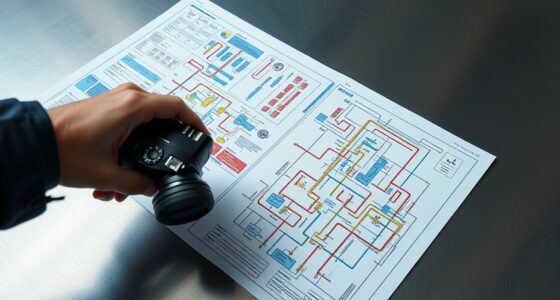To pick the perfect chemistry PhD program, focus on programs offering stable funding like assistantships or fellowships that cover tuition and stipends, so you can concentrate fully on your research. Make sure faculty research interests align with your goals and that they are accessible mentors. Check if the research facilities are well-equipped and whether the program has a strong reputation with successful alumni. Exploring these factors helps you find a program that supports your growth—discover more strategies ahead.
Key Takeaways
- Assess faculty research interests and recent publications to ensure alignment with your academic and career goals.
- Evaluate the program’s funding stability and availability of assistantships, fellowships, or grants for consistent financial support.
- Review research facilities, technology, and interdisciplinary opportunities that enhance research quality and innovation.
- Consider program reputation, alumni success, and placement rates to gauge long-term professional outcomes.
- Investigate mentorship quality and faculty accessibility to ensure supportive guidance throughout your doctoral journey.

Choosing the right chemistry PhD program can be a formidable task, but understanding what factors to prioritize makes the process manageable. One of the most critical considerations is funding opportunities. Graduate school can be expensive, and knowing whether a program offers reliable financial support can make a huge difference. Look for programs that provide assistantships, fellowships, or grants that cover tuition and offer stipends. These resources not only ease financial stress but also allow you to focus fully on your research.
Funding opportunities like assistantships and fellowships are vital for a successful chemistry PhD journey.
Don’t hesitate to ask about the availability and stability of funding throughout your program; some institutions might have limited support after a certain year, which could impact your planning. Securing consistent funding can also influence your choice by enabling you to dedicate more time to your experiments, coursework, and professional development without the distraction of financial worries. Additionally, understanding the availability of research funding can help you gauge the sustainability of the research environment at a given institution.
Equally important is faculty expertise. The strength and focus of a program’s faculty can substantially shape your research experience and future career. When evaluating programs, investigate the research interests of faculty members—ensure they align with your passions. Look into their recent publications, ongoing projects, and collaborations. Faculty who are active in their fields tend to bring fresh perspectives, funding, and connections that benefit their students.
A program with faculty who are leaders in your area of interest can open doors for mentorship, networking, and job opportunities after graduation. Additionally, consider the faculty’s mentoring style and accessibility; a supportive advisor can make a substantial difference in navigating the challenges of doctoral research.
Beyond funding and faculty, it’s wise to assess the program’s overall research environment. Does it have state-of-the-art laboratories? Are there interdisciplinary opportunities? These factors can complement your chosen faculty expertise and enhance your research experience.
Furthermore, understanding the importance of projector technology and its influence on research and presentation quality can be beneficial when considering research facilities and resources available at the program.
Also, consider the program’s reputation and success rate—how many students complete their PhDs on time and secure desirable positions afterward. Sometimes, a program’s prestige or alumni network can also influence your career trajectory.
Frequently Asked Questions
How Do I Evaluate a Program’S Alumni Success Rates?
To evaluate a program’s alumni success rates, look into their alumni career trajectories and post-graduation employment data.
Reach out to the department or check online resources for statistics on where graduates work and their career paths.
Consider attending alumni panels or networking events to hear firsthand about their experiences.
This helps you gauge how well the program prepares students for successful careers in chemistry and related fields.
What Funding Options Are Available Beyond Research Assistantships?
Imagine yourself walking through a campus bustling with opportunities—beyond research assistantships, you can explore scholarship opportunities that ease your financial burden.
Industry internships provide real-world experience and networking advantages, while fellowships offer stipends and prestige.
Look into teaching assistantships, external grants, and departmental awards.
How Important Are Faculty Research Interests Matching My Goals?
You should prioritize faculty alignment because research compatibility directly impacts your PhD experience and success. When faculty interests match your goals, you’ll find better mentorship and collaboration opportunities, making your research more fulfilling.
It’s essential to evaluate potential advisors’ ongoing projects and see if their expertise aligns with your aspirations. Strong faculty alignment ensures you receive the support needed to thrive academically and professionally throughout your doctoral journey.
What Is the Typical Time to Complete a Phd in Chemistry?
Think of earning your chemistry PhD like a marathon; it typically takes 5-6 years. You’ll immerse yourself in intensive coursework, navigate complex research, and utilize excellent lab facilities.
I once knew someone who finished in four years by staying focused and efficiently managing lab time.
On average, expect 2-3 years of coursework and 2-3 years for research.
Patience and dedication are key to crossing that finish line.
How Do Program Location and Campus Culture Impact My Experience?
Your program’s location and campus culture shape your overall experience profoundly. A supportive campus environment fosters collaboration and motivation, while regional opportunities can enhance your research and networking prospects.
Choose a location that aligns with your interests and offers access to resources, industry connections, or specialized facilities. A vibrant campus culture encourages engagement, helping you build relationships and thrive academically during your chemistry PhD journey.
Conclusion
Choosing the right chemistry PhD program is like assembling a complex puzzle—you need the right pieces to see the full picture. By considering factors like faculty expertise, research opportunities, and funding, you’ll craft a foundation that supports your future breakthroughs. Trust your data-driven instincts and stay true to your passions. With patience and persistence, you’ll piece together a program that not only fits your goals but also fuels your curiosity for years to come.









